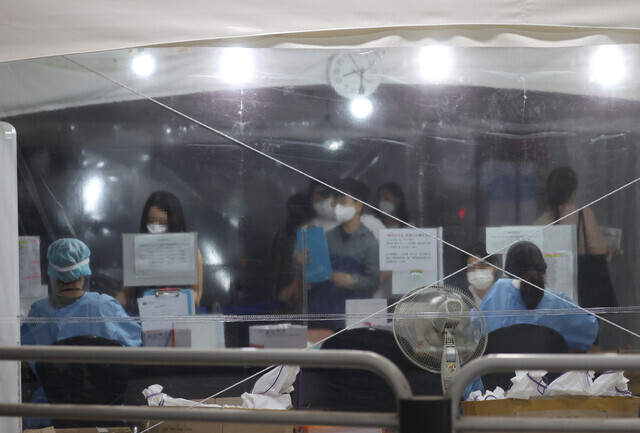hankyoreh
Links to other country sites 다른 나라 사이트 링크
S. Korea reports over 1,000 new COVID-19 cases Tuesday, sees threefold increase in Delta variant cases

South Korea reported more than a thousand new cases of COVID-19 on Tuesday, signaling that the fourth wave of the outbreak has begun. Since about 10% of the people who have tested positive for the coronavirus in Korea over the past week are presumed to have been infected with the highly infectious Delta variant, there are concerns that the surge will get even worse in the coming days.
According to sources from Korea’s Central Disease Control Headquarters (CDCH), the city of Seoul, and Gyeonggi Province, 568 new cases were identified in Seoul on Tuesday by nine that evening. That tops the South Korean capital’s previous daily record of 552, reported on Dec. 25, 2020.
As of 6 pm on Tuesday, Gyeonggi Province tentatively announced 313 new cases of COVID-19 for the day, which also broke the previous record of 303 cases on Jan. 7. Since new cases were soaring with three to six hours left before midnight, when the daily caseload is finalized, the CDCH said the final national tally is expected to be over a thousand.
This development crystallizes the “concerns about an explosive surge” voiced by Jeong Eun-kyeong, commissioner of Korea’s Disease Control and Prevention Agency, on July 1. The daily caseload only topped a thousand on 13 days during the third wave last year. Korea’s highest daily tally so far occurred on Dec. 25, 2020, when the authorities reported 1,240 cases of COVID-19.
Along with the steep rise in new cases, another troubling factor is that the Delta viral variant’s share of locally transmitted cases has tripled over the past week.
The CDCH conducted a genomic analysis of samples from 649 patients who tested positive in the past week (June 27-July 3), finding that 153 (23.6%) had the Delta variant.
When COVID-19 cases brought in from other countries are excluded from the tally, Delta turned up in 62 of 525 cases, representing a detection rate of 9.9%. That was three times higher than Delta’s 3.3% detection rate from the previous week (June 20-26).
Furthermore, Delta infections aren’t limited to the greater Seoul area but have been confirmed in at least 13 of Korea’s 17 provinces and metropolitan areas, leading analysts to think the variant has started to spread around the country. In the last week, Delta was newly identified, either in sporadic cases or infection clusters, in Busan, South Gyeongsang Province, North Jeolla Province, Gangwon Province, and Jeju Island. That followed detection the previous week in Seoul, Gyeonggi Province, Incheon, Daegu, North Gyeongsang Province, South Chungcheong Province, and South Jeolla Province.
While these cases weren’t included in the CDCH’s figures, Daejeon reported on Tuesday that the Delta variant had been confirmed in an infection cluster at a karaoke establishment in the Seo (West) District involving at least 40 cases.
In short, Delta has been found in all of Korea’s 17 provinces and metropolitan areas except for North Chungcheong Province, Gwangju, Ulsan, and Sejong City.
Given the upsurge in new cases of COVID-19, the central government is in deliberations with local government bodies in the greater Seoul area as it pushes to delay the new social distancing measures there for two more weeks.
The level of new cases has prompted authorities to also explore implementing Level 3 of social distancing, but that would enable nightlife establishments, which are currently closed, to operate until 10 pm.
“We’re looking into taking very tough measures, including pushing back the implementation of the new social distancing measures for two weeks,” a senior official in the government said.
By Choi Ha-yan, staff reporter
Please direct comments or questions to [english@hani.co.kr]

Editorial・opinion
![[Guest essay] Maybe Korea’s rapid population decline is an opportunity, not a crisis [Guest essay] Maybe Korea’s rapid population decline is an opportunity, not a crisis](https://flexible.img.hani.co.kr/flexible/normal/500/300/imgdb/original/2024/0430/9417144634983596.jpg) [Guest essay] Maybe Korea’s rapid population decline is an opportunity, not a crisis
[Guest essay] Maybe Korea’s rapid population decline is an opportunity, not a crisis![[Column] Can Yoon steer diplomacy with Russia, China back on track? [Column] Can Yoon steer diplomacy with Russia, China back on track?](https://flexible.img.hani.co.kr/flexible/normal/500/300/imgdb/original/2024/0430/1617144616798244.jpg) [Column] Can Yoon steer diplomacy with Russia, China back on track?
[Column] Can Yoon steer diplomacy with Russia, China back on track?- [Column] Season 2 of special prosecutor probe may be coming to Korea soon
- [Column] Park Geun-hye déjà vu in Yoon Suk-yeol
- [Editorial] New weight of N. Korea’s nuclear threats makes dialogue all the more urgent
- [Guest essay] The real reason Korea’s new right wants to dub Rhee a founding father
- [Column] ‘Choson’: Is it time we start referring to N. Korea in its own terms?
- [Editorial] Japan’s rewriting of history with Korea has gone too far
- [Column] The president’s questionable capacity for dialogue
- [Column] Are chaebol firms just pizza pies for families to divvy up as they please?
Most viewed articles
- 1First meeting between Yoon, Lee in 2 years ends without compromise or agreement
- 2Under conservative chief, Korea’s TRC brands teenage wartime massacre victims as traitors
- 3Months and months of overdue wages are pushing migrant workers in Korea into debt
- 4[Guest essay] Maybe Korea’s rapid population decline is an opportunity, not a crisis
- 5[Column] Can Yoon steer diplomacy with Russia, China back on track?
- 6‘We must say no’: Seoul defense chief on Korean, USFK involvement in hypothetical Taiwan crisis
- 7Dermatology, plastic surgery drove record medical tourism to Korea in 2023
- 8After election rout, Yoon’s left with 3 choices for dealing with the opposition
- 9Two factors that’ll decide if Korea’s economy keeps on its upward trend
- 10[Column] Behind factional animus of Korean politics, victim mentality festers